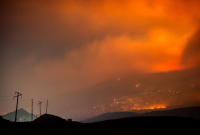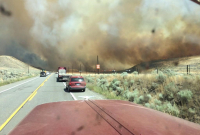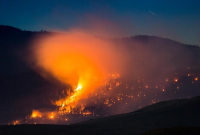Support strong Canadian climate journalism for 2025
Ranchers fleeing wildfires in British Columbia's Interior are leaving behind an estimated 10,000 to 20,000 cattle, hoping the animals' instincts will keep them safe.
The head of the B.C. Cattleman's Association said there are a significant number of ranches established in the Cariboo region, where dozens of fires have been sparked since Thursday.
Association general manager Kevin Boon said with so many fires springing up at once and cattle dispersed across properties for summer grazing, many ranchers didn't have time to collect and move herds.
"We're hoping they're staying ahead of the fire because in a lot of cases with the vastness of the area out there, you just can't get to your cattle," he said.
Boon said it's too early to be sure of the exact numbers of cattle on the range, but if the fires spread, more than 20,000 head could be affected.
Deaths, particularly from smoke inhalation, are expected, he added. Some animals may have to be euthanized in the coming days if they're discovered to be severely injured.
Although ranchers are expecting the worst, Boon said the likelihood of the cows surviving is good.
"These animals have very good instincts. They know what the places are that they can go where they are safe," he said.
Most of the cows are born and bred in the region and know where to find low-lying areas that are moist or by water sources, he said.
"These fires move fast but they're not that fast, these cattle can out-move them," Boon said, adding that the bigger risk with the high number of fires is the cattle fleeing one area only to run into another fire.
Sally Aitken, a Williams Lake resident who was evacuated last week, said she saw a herd grazing as smoke billowed in the distance.
"They all had their heads down and they were eating grass as if nothing was happening," she said. "The worst part of the fire was already down wind of them so they might have been okay ... but they just seemed oblivious."
Boon said losing cattle can have a significant economic impact on ranchers, with breeding cows and their calves worth anywhere from $1,000 to several thousand dollars per head.
Damage to infrastructure, such as fences, and loss of feed will also be costly for ranchers to replace.
"They're reported as forest fires and sure enough the trees are burning but that grass that we utilize underneath is burning," Boon said.
Feed may have to be brought in from other parts of the province or even further afield depending on how significant the losses are once the fires are extinguished.
Boon said some ranchers who also work in lumber mills could be financially hit twice if that industry also suffers damages due to the fires.
"It's all speculation until we know there is damage being done," he said. "A lot of the time we fear the worst, hope for the best and come out not too bad."
Some cows have already been collected and moved to vacant ranches, and Boon said efforts are underway to determine whether other cattle need to be moved or delivered more feed.
He said there are disaster relief funds that will kick in to support farmers and his organization is already planning to help rebuild fences.
As people return to communities that were evacuated, Boon said "it may look bare and barren" but drivers should be wary that "there is a good chance there will be some cattle or other wildlife on those roads."





Comments
There will be a tremendous impact on wildlife, losing food sources, habitat, and young from the fires. What's to become of them?